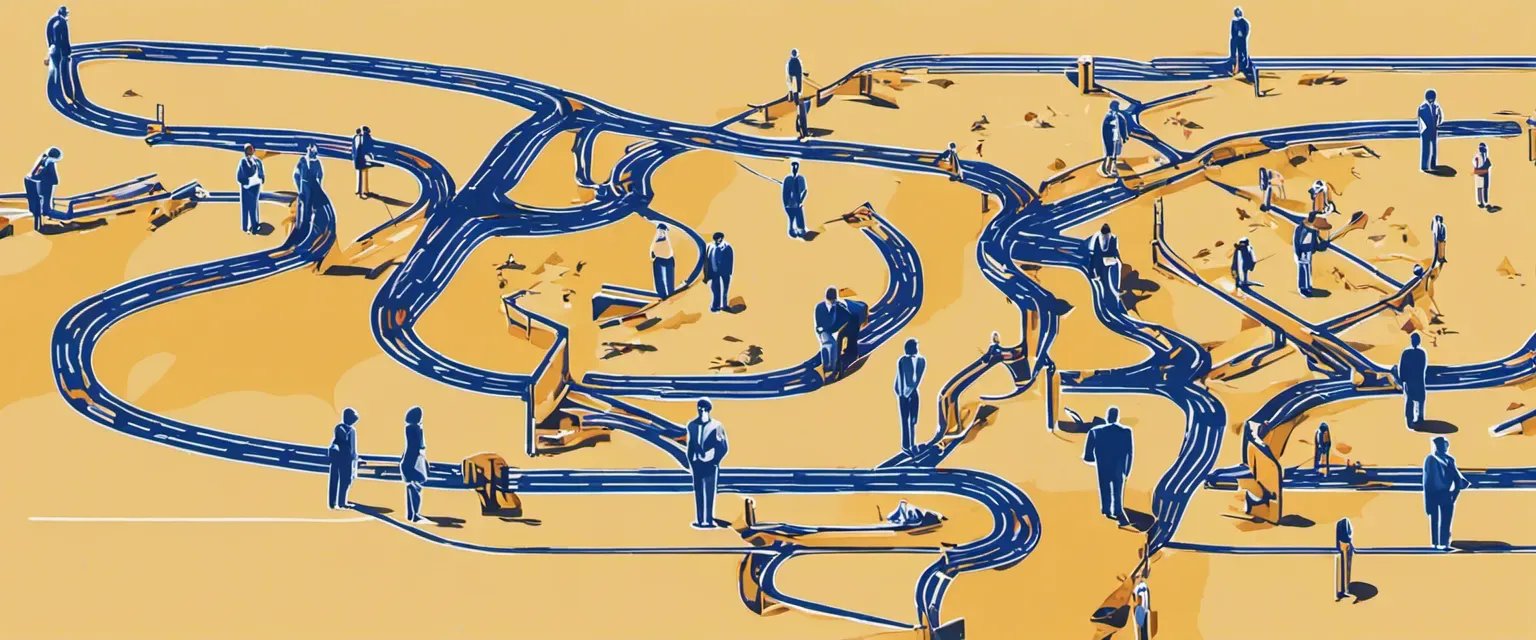
Sign up to get updates from us
By signing up, you agree to receive email from this podcast.

"The Paradox of Choice" explores the impact of excessive options on decision-making, highlighting how too much choice can lead to anxiety and dissatisfaction.
 Chapter 1 Delve deeper into The Paradox of Choice's message
Chapter 1 Delve deeper into The Paradox of Choice's messageThe Paradox of Choice: Why More Is Less is a book written by psychologist Barry Schwartz. It explores the idea that having an abundance of choices might not always lead to better outcomes and increased satisfaction. Schwartz argues that having too many options can lead to decision-making paralysis, increased regret, and decreased happiness.
According to Schwartz, although having options can initially seem empowering, it often becomes overwhelming as individuals feel the pressure to make the best choice among numerous possibilities. This abundance of choices can lead to decision fatigue, where individuals become mentally exhausted by evaluating each option and weighing the pros and cons. As a result, people may end up feeling less satisfied with their decision, constantly questioning if they could have made a better choice.
Another aspect of the paradox of choice explored by Schwartz is the concept of opportunity cost. When faced with a wide range of options, individuals may continually consider the other possibilities they didn't choose. This leads to feelings of regret and a constant comparison to alternative paths not taken.
Schwartz suggests that an ideal balance between choice and simplicity is necessary to avoid the negative consequences of excessive options. He advises individuals to focus on what they truly value and prioritize their preferences, limiting unnecessary choices to prevent decision overload.
Overall, The Paradox of Choice presents a thought-provoking perspective on the impact of too many choices on individuals' well-being and offers insights on how to navigate decision-making in a world of abundance.
The Paradox of Choice by Barry Schwartz is generally considered to be a good book. It explores the concept of choice and the impact it has on our lives, arguing that an abundance of choices may lead to decision paralysis, dissatisfaction, and regret. Schwartz suggests that having too many options can decrease our overall well-being and offers insights into how to navigate this paradox. The book has received positive reviews for its thought-provoking content and practical advice on simplifying decision-making. However, personal opinions may vary, so it is advisable to read a few reviews or summaries to determine if the book aligns with your interests and goals.
"The Paradox of Choice" by Barry Schwartz explores the idea that having too many choices can actually lead to unhappiness and indecision. Schwartz argues that although having choices is often seen as a positive thing, it can also be overwhelming and burdensome.
Schwartz begins by discussing how the increase in options in modern society has resulted in a paradoxical decrease in satisfaction. He cites examples such as shopping for jeans or ordering food at a restaurant, where having a multitude of options can lead to uncertainty and dissatisfaction. Schwartz suggests that this is because having too many choices creates unrealistic expectations, as there is always the possibility of finding something better.
Furthermore, Schwartz explains that having too many choices can also lead to decision paralysis. When faced with numerous options, people may struggle to make a decision, fearing that they will make the wrong choice and regret it later. This can lead to feelings of anxiety and dissatisfaction.
Schwartz then explores the concept of "maximizers" and "satisficers." Maximizers are individuals who constantly seek the best option, often feeling a sense of disappointment and regret when they make a choice. On the other hand, satisficers are individuals who are content with finding an option that meets their basic criteria. Schwartz argues that satisficers tend to be happier and less stressed than maximizers, as they are not constantly burdened by the fear of making the wrong choice.
In the latter part of the book, Schwartz suggests strategies for managing choice overload. He emphasizes the importance of setting clear criteria when making decisions and not obsessing over finding the absolute best option. He also suggests that limiting options and not comparing every possible choice can lead to greater satisfaction.
Overall, "The Paradox of Choice" highlights the negative impact that an abundance of choices can have on our well-being. It encourages readers to rethink their approach to decision-making in order to find greater happiness and contentment in a world filled with endless options.
The author of the book "The Paradox of Choice" is Barry Schwartz. He released this book in 2004.
Barry Schwartz has written several other books apart from "The Paradox of Choice." Here are some notable ones:
In terms of editions, it would depend on personal preference and the specific topic of interest. "The Paradox of Choice" has not undergone significant revisions or updates since its initial release.
The Paradox of Choice is a concept introduced by psychologist Barry Schwartz in his book of the same name. It refers to the notion that having too many options or choices can actually lead to feelings of unhappiness, dissatisfaction, and a significant decrease in the ability to make decisions.
Schwartz argues that while having choices is generally seen as a positive thing, it can also be overwhelming and lead to decision paralysis. When faced with a multitude of options, people tend to experience anxiety, fear of making the wrong decision, and a fear of missing out on something better. This can ultimately lead to a state of dissatisfaction, as the abundance of choices raises expectations and makes it difficult to fully commit to any one option.
The Paradox of Choice can be seen in various aspects of everyday life, such as shopping, careers, relationships, and even simple decisions like selecting a toothpaste. The more choices there are, the more difficult it becomes to make a decision and the more regrets or doubts one may have after making a choice.
Schwartz suggests that rather than striving for the "perfect" choice, individuals should aim for "good enough" options. By limiting options and focusing on what truly matters, people can alleviate the stress and potential dissatisfaction that comes with excessive choices.
Overall, the meaning of The Paradox of Choice is that while choice and freedom are important, an excess of choices can lead to negative consequences. Simplifying decision-making processes and focusing on what truly matters can lead to greater happiness and satisfaction in life.
The main theme of "The Paradox of Choice" by Barry Schwartz is the negative impact of too many choices on individuals and society.
Throughout the book, Schwartz argues that while having options can initially seem beneficial, it often leads to decision paralysis, dissatisfaction, and regret. He suggests that the abundance of choices in our modern world has led to increased anxiety and decreased well-being.
Schwartz explores various aspects of this theme, including the psychological implications of choice overload, the cultural influences on our decision-making, and the role of advertising in perpetuating the idea that more choices equate to more freedom and happiness.
Additionally, Schwartz examines the concept of satisficers (people who make a decision once their criteria are met) versus maximizers (people who constantly search for the best option). He argues that maximizers are more prone to decision fatigue and regret, while satisficers tend to be more content with their choices.
Overall, the theme of "The Paradox of Choice" suggests that while having options can be beneficial, there is a point where too much choice becomes overwhelming and detrimental to individual well-being. Schwartz advocates for a more mindful approach to decision-making and urges society to reconsider the emphasis on unlimited choices as the key to happiness.
- The original book by Barry Schwartz explores the concept of how having too many choices can lead to decision paralysis and dissatisfaction.
- A popular TED Talk where Barry Schwartz gives a condensed version of his book's main ideas, discussing the paradox of choice and its impact on decision-making.
- An animated video based on Barry Schwartz's TED Talk, explaining the paradox of choice in a more visually engaging way.
- The Hidden Brain podcast hosted by Shankar Vedantam features an episode on the paradox of choice, where they discuss Barry Schwartz's research and how it influences our decision-making.
- This article explores the psychological effects of having too many choices, referencing Barry Schwartz's work and providing insights on decision paralysis.
- A video summary of Barry Schwartz's book, presenting key ideas and concepts in a concise format.
- An interview with Barry Schwartz discussing the paradox of choice in relation to decision-making at both personal and professional levels.
- A blog post that delves into the paradox of choice and provides practical strategies for managing decision overload, drawing from Barry Schwartz's research.
- This academic paper by Barry Schwartz and Andrew Ward reviews numerous studies related to the paradox of choice, summarizing and analyzing the findings on how choice overload affects individuals.
- Barry Schwartz's official website where you can find more resources and information related to his work, including the paradox of choice.
The Paradox of Choice quotes as follows: